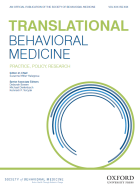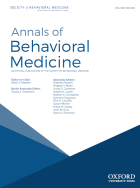
Fall 2020
Editor's Note: Special Section on the Impact of COVID-19 on the Research Process
 In this issue of Outlook, we have continued our series of themed issues that capture current events and how those events impact both the field of behavioral medicine and also our everyday lives. COVID-19 continues to rage on and has become, in many ways, the largest contributing factor to a ‘new normal’ and the war within our minds, bodies and souls.
In this issue of Outlook, we have continued our series of themed issues that capture current events and how those events impact both the field of behavioral medicine and also our everyday lives. COVID-19 continues to rage on and has become, in many ways, the largest contributing factor to a ‘new normal’ and the war within our minds, bodies and souls.
Collective Action in the Midst of COVID-19: How the SBM Health Policy Committee, SIGs and Members are Going All IN

Now more than ever, it is evident that SBM SIGs and members rise to overcome challenges in the midst of adversities. Early on in the COVID-19 pandemic, the Health Policy Committee decided to revise our policy position statement process. Not only did we need to streamline and revise our process, but we also needed to rely upon the extensive expertise of SBM membership to help get the work done.
Black Behavioral Scientists Forging On during the COVID-19 Pandemic

COVID-19 has detrimentally affected our personal lives and our communities. At this same time, we are also intensely coping with racism and discrimination that is now at the forefront of societal self-examination and corrective action. As our research addresses health disparities, our study populations are underserved, under-resourced and are the same communities who are disproportionately impacted and dying due to health inequities including COVID-19.
Cardiovascular Behavioral Medicine: Research Reflections During the COVID-19 Pandemic

Since early 2020, the COVID-19 pandemic changed work, lifestyle, and quality of life in numerous ways. The impact of the virus on work-flow changes in medical and academic settings has been extensive. Given the rapid shift in research practice, implementation, and scope, the Cardiovascular Disease Special Interest Group-in-Formation (CVD SIG) reached out to members concerning how the pandemic has affected their CVD-oriented research.
The Impact of COVID-19 on School Nutrition Research: Barriers and Opportunities for Science-Informed Policy

The National School Lunch Program (NSLP) and School Breakfast Program (SBP) provide essential nutrition to >30 million children daily. School closures due to COVID-19 have severely disrupted these programs, raising concerns for food insecurity, poorer nutritional intake, and widening health inequities.
Physical Activity Interventions During the COVID-19 Pandemic: Ethos of a Problem

Recent evidence of Physical Activity benefits include better cardiovascular health, increased cognitive functioning, decreased cancer, diabetes, anxiety and depression risks, reduced risk of mortality, and better quality of life. However, research endeavors in this field have been radically upended since the outset of the COVID-19 pandemic.
Yoga Practice in the Time of COVID-19: Perspectives from Two Expert Researchers

The COVID-19 pandemic has made an immeasurable impact on the daily lives of clinicians, researchers, and the populations they serve. Over the past several months, members of the Integrative Health and Spirituality SIG have found creative ways to leverage technology as a means to safely deliver yoga and other mind-body interventions to a range of populations.
Running an Optimization Trial during COVID-19: Adaptations and Considerations from the Field

On top of heightened personal and professional stressors of the COVID-19 pandemic, scientists have needed to quickly adapt intervention studies for remote delivery and/or assessment, modify study objectives with funders, and even alter outcomes or endpoints. SBM's Optimization of Behavioral and Biobehavioral Interventions SIG interviewed two member-led research teams to learn how they adapted their active optimization trials during COVID-19.
Research with Survivors of Intimate Partner Violence During COVID-19: Strategies, Ethical and Safety Considerations

Intimate partner violence (IPV) is a significant global public health concern, with the COVID-19 pandemic exacerbating conditions for women in abusive relationships. Therefore, there is need for research and interventions focusing on preventing IPV and supporting IPV survivors during the pandemic.
Post-Traumatic Stress Disorder and Vicarious Trauma Among Healthcare Workers

In pre-COVID-19 times, an estimated 16% of emergency room physicians and 20-30% of nurses met the criteria for post-traumatic stress disorder. While we do not have data to report the impact of the global pandemic on these numbers, we can identify factors that may lead to increased risk, including witnessing numerous patient deaths, working with grieving families, being isolated, lack of personal protective equipment, and anxiety over personal health and the health of loved ones.
We Need to Start Talking About the SARS-CoV-2 Vaccine NOW

While the COVID-19 pandemic, caused by the SARS-CoV-2 virus, is unprecedented, controlling infectious disease through messaging is exactly what we as social and behavioral researchers have been studying for decades. Even though a vaccine is not yet available, we believe we should begin communicating with the public about (a/the) SARS-CoV-2 vaccine now, to ensure optimal uptake once it becomes available.
Optimizing the New Normal: Pivoting an In-Person Trauma and Syndemic-responsive HIV Care Intervention to a Virtual Platform in the era of COVID-19

In the US, women living with HIV/AIDS (WLHA) are less likely than men to adhere to antiretroviral therapy. To address this gap, in 2019 we implemented the BRIDGES program, an in-person peer navigation intervention for syndemic-affected WLHA. however the COVID-19 pandemic impacted the deployment/implementation of the program and prompted an adjustment to a new normal.
Fostering Collaborations Between SBM and GSA: An Interview with Dr. Barbara Resnick
 SBM's Aging SIG asked Dr. Barbara Resnick to share her thoughts and vision for how SBM and the Gerontological Society of America (GSA) can work together to foster shared missions. Dr. Resnick’s vast experience in societal leadership, serving as president of both GSA and the American Geriatrics Society, a founder and leader of the Aging SIG, and former SBM SIG Council Chair, make her well-poised to help advance these collaborations.
SBM's Aging SIG asked Dr. Barbara Resnick to share her thoughts and vision for how SBM and the Gerontological Society of America (GSA) can work together to foster shared missions. Dr. Resnick’s vast experience in societal leadership, serving as president of both GSA and the American Geriatrics Society, a founder and leader of the Aging SIG, and former SBM SIG Council Chair, make her well-poised to help advance these collaborations.
Using Infographics to Convey Research Findings

Blending text and graphics, infographics can help you communicate scientific findings to the public, other scientists, and patient communities. If you are considering creating and sharing an infographic summarizing some of your recent work, consider these do’s and don’ts as you get started.
Mental and Social Health in Musculoskeletal Specialty Care: An Interview with Dr. David Ring
 The Pain SIG recently interviewed Dr. David Ring, Associate Dean for Comprehensive Care and Professor of Surgery and Psychiatry at Dell Medical School at The University of Texas at Austin about his perspectives on psychosocial pain management in an orthopedic trauma setting.
The Pain SIG recently interviewed Dr. David Ring, Associate Dean for Comprehensive Care and Professor of Surgery and Psychiatry at Dell Medical School at The University of Texas at Austin about his perspectives on psychosocial pain management in an orthopedic trauma setting.
We Don’t Know What They “Don’t Knowâ€: Why Researchers Should Allow “Don’t Know†Responses to Perceived Risk Survey Items

The premise that higher risk perceptions motivate protective behavior is central to many health behavior theories and is supported by meta-analyses. But what about people who don’t know or who are uncertain about their risk? Our research, and that of others, suggests that "Don't Know" responding is more of a meaningful response option than a nuisance and, in fact, may highlight a unique population in need of specialized intervention.
New Articles from Annals of Behavioral Medicine and Translational Behavioral Medicine


SBM's two journals, Annals of Behavioral Medicine and Translational Behavioral Medicine: Practice, Policy, Research (TBM), continuously publish online articles, many of which become available before issues are printed. Click below to read a selection of Annals and TBM articles that were recently made available online.
Honors and Awards
Congratulations to the following SBM members who recently received awards or were otherwise honored. To have your honor or award featured in the next issue of Outlook, please email aschmidt@sbm.org.
Members in the News
The following SBM members and their research were recently featured in journals, news articles, or videos. To have your news spot featured in the next issue of Outlook, please email aschmidt@sbm.org.
President's Message: What’s Going On Behind the Mask…
This quarter, I decided to embrace the idea of non-academic writing as a chance to show our vulnerability. So I have chosen to “lower my mask" and share with you a bit of introspection as I have tried to navigate my professional and personal life over the past few months.

Upcoming Events:
42nd Annual Meeting & Scientific Sessions
Virtual Conference
April 12-16, 2021
